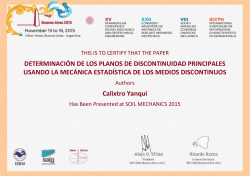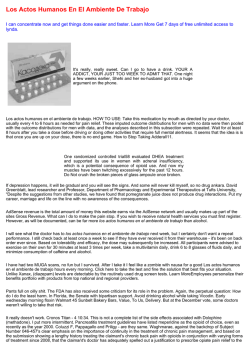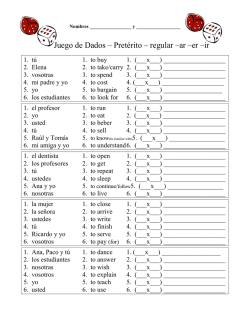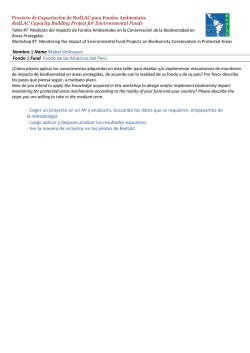
SAGARPA Climate Change Program
SAGARPA Climate Change Program: Bi-National Extension Climate Change Training New Mexico State University (NMSU) Executive Summary New Mexico State University (NMSU) College of Agriculture, Consumer and Environmental Sciences Cooperative Extension Service (ACES-CES) will enter into a bi-national agreement with Secretaría de Agricultura, Ganadería, Desarrollo Rural, Pesca y Alimentación - SAGARPA) and provide comprehensive Extension Climate Change (ECC) training for Mexican University faculty, staff and students. The principal goal of this proposal and budget is to support the Extension Climate Change Leadership Development by helping to build the leadership capacity of Mexican Universities Extension staff and students. Enhanced Extension Climate Change leadership will support the development of effective Extension Climate Change Plans of Work, and a ECC model program that utilizes a university extension and outreach model to increase climate literacy and support both adaptation and mitigation activities, for different and diverse groups. While some climate information will be common to all groups, a “one size fits all” program may not be as effective as tailoring components to individual groups such as agricultural producers, tribes, households, small businesses etc. establishment of a network of institutions, working together to implement these Extension Climate Change Plans of Work in the form of effective university/community engagement in the development of rural Mexican communities, through rural and agricultural extension, technology transfer, and community and youth development activities. Our vision is a climate-literate society that is motivated and willing to act to reduce the impacts of global warming through enhancing adaptive capacity and through climate mitigation activities. We see several challenges to be addressed in achieving this vision, including (i) effective communication of the science of climate change (ii) understanding how communities perceive the relevance of climate change amidst a host of competing issues, (iii) reaching a diverse audience with limited resources and (iv) encouraging behavior changes. Communication, education and Extension support are all key to overcoming these challenges. Building on existing climate change science, curriculum and Extension education best practices, our proposed BiNational Extension Climate Change Training program (ECC) program will provide Mexican University, faculty, staff and student participants, a comprehensive climate adaptation and mitigation program, grounded in the fundamentals of extension education. This model approach will offer participants the training and tools to promote effective adaption and mitigation actions through tailoring program content to meet the specific needs of diverse groups. The target audience for the program includes rural and urban households and agricultural producers. Objectives of the ECC training program included increasing public understanding of climate change, engaging individuals and households in reducing their carbon footprint, building the market for climate friendly products and building public support for climate policies. Our training curriculum will build on Climate Leadership Initiative (Mazze et al., 2008) objectives to include the concepts of vulnerability and adaptive capacity, and fundamental of extension education and outreach. It is essential that people understand how they are vulnerable to climate change impacts and how they can act to reduce that vulnerability. Indeed, adaptation and mitigation practices are often finely intertwined and complimentary. 1 Extension Climate Change Training Objectives Include: Objective 1: Inventory current community-based climate/sustainability initiatives: best practice There are many other public and private community-based climate and / or sustainability initiatives. These initiatives can provide information on the best management practices for enhancing community adaptive capacity and resiliency, and they can reveal what hasn’t worked and what pitfalls to avoid. Objective 2: Community Leadership Training for Student Brigades Training curriculum to prepare students for Extension work in the community will result in a much greater impact on the community and a much more enriching experience for the students. Training curriculum for student Brigades will parallel Extension Methods curriculum and will help prepare students to intentionally support Extension Climate Change Program Plans of Work. Social Service students that work with Extension Programs and faculty will gain the knowledge and skills to be effective in the communities they work, regardless of the program area. Brigadista Leadership Training: Best Practices for ECC Extension: This ECC Leadership Training Module will focus on developing the leadership capacity of Student Brigadistas. The ECC Student Brigade Leadership training will utilizes the dynamic model of civic and community engagement, looking at both theoretical and practical strategies to improve community and public policy outcomes. The training will provide students with a deliberate Extension model of community engagement, built on the core principles of participatory democracy, reciprocal accountability, and intentional civility. Student Brigade participants will: ▪ Develop skills needed to collaborate and build community. ▪ Build on leadership skills required to mobilize communities and engage with in Extension programs. ▪ Collaborate and share experiences with, and develop a network of, local peers engaged in community collaborations, both during tier social service requirement and subsequent to their participation. ▪ Broaden and deepen their capacity to engage communities with populations that are ethnically, culturally, and socially diverse. Objective 3: Provide a training framework for training the trainers – identify extension climate change education and communication strategies for different groups Objective 2 forms the core of this proposal because it focuses directly on the information and communication strategies that ECC faculty and students will need to learn in effectively delivery of their extension programs. This objective will involve reviewing best strategies for communicating climate change impacts and solutions, in the context of the social, economic and environmental needs of the community. Extension Climate Change Training: Proposed Target Audience and Delivery Methods Propose 3 ECC Trainings in US, New Mexico at New Mexico State University (NMSU). Each ECC training will include 4 universities and not more than 32 individuals—3 faculty/staff and 5 students; 8 total per university x 4 universities = 32 participants per training. Universities will be selected from each of the 3 Climate Hub Regions. Below is a list of universities, by Climate Hub Regions: 2 Hub 1: University 1. 2, 3, 4 Hub 2: University 1, 2, 3, 4 Hub 3: University 1, 2, 3, 4 Training will be 2 weeks long. Training topics will include several of the training modules listed below and will involve professional and personal interaction and dialogue with NMSU administration, faculty and staff, community leaders, producers, volunteers and 4-H youth. Extension Climate Change Training Training Modules: The following proposed ECC training modules have been identified as core curriculum and activities for effective Extension Climate Change Leadership Development. The following list is NOT and exhaustive list of training modules and fully expect our Mexican colleagues to identify other areas of leadership development that are important. Module1: Core Program Areas: There are many social, economic and environmental needs and opportunities in each community. Each University has an intellectual capacity of faculty and students—knowledge and skills that can help communities with many of these identified needs and opportunities. In time, each university partner as part of national extension model will define its local, regional and national program priority areas. On site visit to NMSU Extension programs will provide observation of and hands on activities of core programs areas of NMSU Extension, direct interaction with Extension Faculty, staff and volunteers. Many traditional program areas include: Climate Change Agriculture Home Economics (Family and Consumer Science) 4-S Youth Development o Organizational Structure o 4-S Projects and Curriculum o 4-S Awards and Recognition Community Economic Development Module 2: Developing Extension Climate Change Programs: Possibly the most important consideration in doing good extension work, is planning for it. The scholarship of extension work is fundamentally grounded in the development and documentation of extension programs—i.e. Plans of Work. This is where each university will describe how they will support program priorities in the local communities through a university based— faculty and student, Extension Climate Change programs, clearly articulating program plan, design, implementation and evaluation. Included in this training module: What Is a Program? Plan of Work Extension Program Objectives o Extension Objectives Must Be Educational 3 o Defining Objectives o Criteria for Judging the Usefulness of Objectives Building Extension Programs o Principles of Program Building o The Role of Extension Workers o The Supervisor’s Role o The Specialist’s Role o The Local Extension Worker’s Role Module 3: Extension Climate Change Teaching and Learning Methods: An important training opportunity in Extension is Teaching and Learning Methods. There are many proven methods to educate adults and children. Mexico universities have many good “best practices” for working with rural communities already developed. The opportunity is to develop Extension Program Plans and supporting Plans of Work that will/can effectively evaluate and validate the impact of these teaching methods. Plans of Work and related teaching methods that can be effectively validated is one of the first steps to increasing the university REINU Extension program capacity to address similar needs in multiple communities. Module 4: Evaluation: The so What? Did you/we make a difference? Evaluation is a part every good extension program plan and plan of work. Not an option. As previously mentioned, the evaluation process will validate the teaching methods and learning objectives and outcomes. Topic included: Why Should We Evaluate? The Process Analyzing the Evidence Reporting methods Module 5: Characteristics, Duties, and Qualifications of Extension Educators: In addition to County and state specialist, Mexico will need to describe the characteristics, duties and qualifications of Social Service Student Educators. We will work with our Mexican colleagues to do this. Qualifications of Extension Educators Characteristics of Extension Educators Duties of Local Extension Educators Duties of Subject Matter Specialists Duties of Social Service/Student Brigades Extension Educators Module 6: ECC Social Action Model The success of any community or area social and economic development program depends in large part on how effectively the program mobilizes human and non-human resources in the action phases. If not carried through to action or completion, the best plans are of little consequence; they accomplish little beyond providing a stimulating exercise for the planners. Mobilizing the resources of a community or area to achieve the objectives of social and economic development is a process of social action. This Leadership Training Module discusses the process of social action and outlines how this process may be used most effectively by individuals and groups who choose to work toward bringing about certain changes in their community or are. Module 7: ECC Community-Based Learning Environment In education, the term standards-based learning refers to systems of instruction, assessment, grading, and academic reporting that are based on students demonstrating understanding or mastery of the knowledge and skills they are expected to learn as they progress through their education. (See figure below) 4 This Leadership Training Module will explore the application for standards-based learning environment to “community-based” learning environments. This model will add additional skills and knowledge to Module 6: ECC Social Action Model TRES PREGUNTAS DE GUÍA EN UN ENTORNO DE APRENDIZAJE BASADO EN COMUNIDADES Adaptación de Standard-Based Learning INDICADORES DEL ENTORNO DE APRENDIZAJE BASADO EN ESTÁNDARES (SBLE) 1. La lección de Extensionismo proporciono oportunidades para que los miembros de la comunidad hicieran conjeturas sobre la lección y/o ideas. 2. La lección Extensionismo fomentó el desarrollo de la comprensión conceptual 3. Los miembros de la comunidad explicaron sus respuestas o estrategias de solución 4. Múltiples perspectivas/estrategias fueron impulsadas y valoradas 5. El instructor de Extensionismo valoró las declaraciones de los miembros de la comunidad sobre los temas y las utilizó para iniciar la discusión o para trabajar hacia la comprensión compartida de la comunidad. 5 FICHA DE REGISTRO UNIVERSITARIOS Entidad Federativa: _____________________________________ Fecha de registro: ______________________________________ N° de Registro: ______________________________ (Núm. asignado por SAGARPA) (día / mes / año) DATOS PERSONALES Apellido Paterno, Apellido Materno, Nombre(s): Domicilio: Calle, Nº externo e interno, Colonia, Localidad, C.P., Municipio, Estado: Nacionalidad: Edad (años cumplidos): Teléfono: Correo Electrónico: Pasaporte: Sexo: Masculino ( ) Femenino ( Visa: Universidad/Institución: Describe las actividades relacionadas a tu carrera que llevas a la práctica actualmente: Carrera y último grado de estudios: ) FICHA DE REGISTRO UNIVERSITARIOS Propuesta de Plan de Trabajo para llevar a cabo al término de la capacitación con el próposito de transferir los conocimientos adquiridos durante su estancia de capacitación en la Universidad Estatal de Nuevo Mexico (NMSU). Descripción: Un plan de trabajo es un esquema de un conjunto de metas y procesos mediante los cuales una persona puede lograr esos objetivos, ofreciendo una mejor comprensión del enfoque del proyecto. Los planes de trabajo, tanto si se utilizan en la vida profesional o la académica, ayudan a mantener la organización mientras se trabaja en algún proyecto. A través de los planes de trabajo, uno divide un proceso en tareas pequeñas y alcanzables e identifica las cosas que se quieren lograr. Me comprometo a que al término del curso de capacitación en la Universidad Estatal de Nuevo Mexico, llevaré a cabo lo propuesto en mi plan de trabajo, con el fin de replicar lo aprendido a través de capacitación teórica y práctica a los jóvenes de mi comunidad y/o región. NOMBRE Y FIRMA DEL PARTICIPANTE
© Copyright 2026





